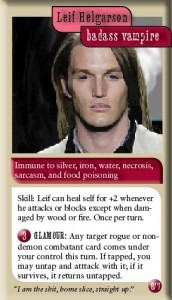Writer's Grove
The Vampire Derailment
 Sometimes writing is like spelunking; you go down what seems to be a perfectly sound passage, there are cool little stalactites and bioluminescent organisms and micro-evolved blind fish and everything, and then suddenly it just gets too weird or it goes nowhere and you have to turn around.
Sometimes writing is like spelunking; you go down what seems to be a perfectly sound passage, there are cool little stalactites and bioluminescent organisms and micro-evolved blind fish and everything, and then suddenly it just gets too weird or it goes nowhere and you have to turn around.
That happened to me while I was writing Hammered. Thought I’d share this little episode for writers (and for readers, too) to illustrate how you can write something that sounds okay on the surface, but has to be jettisoned because it doesn’t work for the story.
WARNING: if you haven’t read Hammered yet, what follows is going to be full of spoilers! It’s best to actually bust out your copy of the book to fully appreciate what’s going on here.
What happened is that I wrote 3,700 words that I had to chuck because the plot was going in a direction that made no sense for the overall book. I took bits and pieces of the material and worked it into the book later on—you’ll recognize some passages about the nature of vampirism, Atticus taking Leif to a baseball game, and even Oberon’s professed love for The Boondock Saints. Basically, when Leif asks Atticus to go with him to kill a bunch of vampires in the Phoenix metro area the night before they leave for Asgard, Atticus agrees instead of protesting that he needs to stay fresh for the coming journey. So here’s this story about Thor and Asgard, and I have my main character dropping everything for an extended session of vampire slaying, going out to University of Phoenix Stadium and laying about with Fragarach. The passage ends very abruptly, because that’s when I asked myself, “What the fuck am I doing? He’s supposed to be going to Asgard!” There were too many other things Atticus had to do before I could get him to leave and confront the Norse, and this was an unnecessary episode that I could simply have Leif report on later.
If you’d like to follow along, turn to page 84 in Hammered. Two thirds down the page, you’ll see Atticus say to Leif: “I see. And you’d like my help? As in, tonight?” Leif says “Yes.” Instead of continuing with “That was precisely what I’d been afraid of,” because that’s obviously what I wound up writing instead, continue reading from the PDF below. Have fun spotting the bits that made it into the book, but you’ll also see some more stuff about Phoenix that I’m kind of sorry I couldn’t work in somehow.
Most writers (I can’t say all) have probably dealt with something like this—some of them many times, on a much larger scale. You can spend days and days on something and then realize that it’s not going to work, and you have to chuck it all and start over in the service of the story. Occasionally people get the impression that writers just sit down and the novel flows out perfectly from beginning to end, but that’s even a bigger fantasy than the collected works of Tolkien. Writing a novel is a never-ending series of cock-ups and happy accidents supervised by our own private collection of neuroses and occasionally our editors. You have to respect that process in order to produce something worth reading. And sometimes that process can take a while.
I’m currently revising Tricked and working through issues that I didn’t see as I was writing—my editor is brilliant and I’m so glad she can see all of my blind spots. We still have a way to go in the process, but right now it’s looking like Tricked will be a bit longer than Hammered. (A friendly observation: telling an author to “write faster” is akin to telling a baby to “gestate faster!” Novels and babies can only grow as fast as nature allows.)
If you’re in Arizona, please check out my Events & Appearances page. I’ll be appearing at the Teague branch of the Glendale Public Library on Saturday, September 17, so I’d love to see you there if you can make it!

